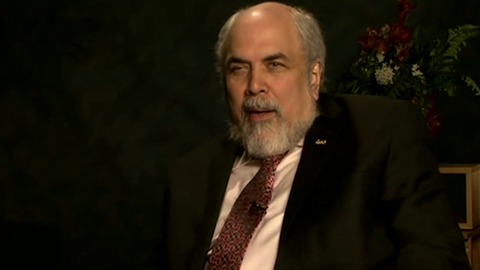Only in the past couple of decades have the Courts begun to recognize that discriminatory treatment of people with disabilities can raise some significant constitutional issues. This recognition went hand-in-hand with the shift from viewing disabilities as primarily a medical issue to viewing disabilities as a social issue. If a person’s disability is primarily seen as a medical issue, then the primary focus is going to be how to take care of that person, protect them, and perhaps try to cure them: a focus that led to institutionalization and segregation. More recently, many people with disabilities have come to understand themselves as members of a minority group in a society that’s structured around the norms of the majority.
Judge Donovan Frank: ADA to Today
Professor Elizabeth R. Schiltz: Understanding Disabilities
Many of the obstacles to full integration in society are not really the medical issues raised by the disability, but are rather social norms that discriminate against people with disabilities. For example, buildings built with stairs at the entrance, instead of ramps, may be what disables the person who uses a wheelchair. A social stigma associated with an irrationally discriminatory view of people with disabilities might be what hinders a person from getting a job, rather than any real inability to do that job. As this shift in how we think about disabilities began to occur, some of the ways that people with disabilities were treated differently from others began to be seen as discrimination, and began to be challenged as violations of civil rights, raising constitutional issues.
Professor Elizabeth R. Schiltz: Equal Protection and Due Process Explained
Professor Elizabeth R. Schiltz: Due Process Clause
If a state enacts any sort of law or starts treating some of its citizens differently than other citizens, this raises questions under the Equal Protection Clause of the Fourteenth Amendment to the Constitution. And the Constitution also forbids States from enacting any sort of law or treating its citizens in any way that deprives them of “life, liberty, or property,” without “due process of law”, under the Due Process Clause of the Fourteenth Amendment.
Summary discussions of the evolution of the fundamental legal rights of people with disabilities, with links to relevant Constitutional provisions, statutes, regulations, and key cases, can be found here:
Reform of Institutions and Closing of Institutions
- Willowbrook (New York)
- Wyatt (Alabama)
- Welsch & Jensen (Cambridge, Minnesota)
- Pennhurst (Pennsylvania)
- Youngberg v. Romeo (Pennsylvania)
- City of Cleburne (Texas)
- Olmstead (Georgia)
Right to Self-Determination
- Freedom from Involuntary Sterilization
- Freedom from Involuntary Servitude (Employment)
- Right to Education
- Right to Vote
- United Nations Convention on the Rights of People with Disabilities
- Americans With Disabilities Act (ADA) of 1990 (Amended 2008)
In addition to the U.S. Constitution and the U.N. Convention on the Rights of the Persons with Disabilities, the rights of people with developmental disabilities are protected by a number of federal laws. View a list of these other disability rights laws.
The Convergence of Disability Law and Policy: Core Concepts, Ethical Communities, and the Notion of Dignity
Interview with Rud Turnbull
Produced by Minnesota Governor’s Council on Developmental Disabilities
Throughout Rud Turnbull’s teachings and writings about the 18 core concepts of disability policy, and as those concepts relate to the Americans with Disabilities Act, IDEA and its predecessors, assistive technology, family support, and aversive therapies, he speaks about relationships – those that are created and those that are challenged when people are forced to confront each other.
The Evolution of Disability Rights Litigation
Interview with David Ferleger, J.D.
Produced by Minnesota Governor’s Council on Developmental Disabilities
Developmental Disabilities and Equal Justice Under the Law, Including Employment and Diversity
Portions of a Presentation by U.S. Judge Donovan W. Frank, St. Paul, Minnesota – November 19, 2007
Update on EPSDT Litigation Trends
National Health Law Program
EPSDT is mandatory Medicaid program for children and youth under the age of 21. “The goal of EPSDT is to assure that individual children get the health care they need when they need it – the right care to the right child at the right time in the right setting.”
This update highlights litigation history about EPSDT and trends. Recent cases are seeking targeted relief rather than systemic change. Cases pending before the US Supreme Court could affect private enforcement of several Medicaid provisions, including those that address EPSDT.


